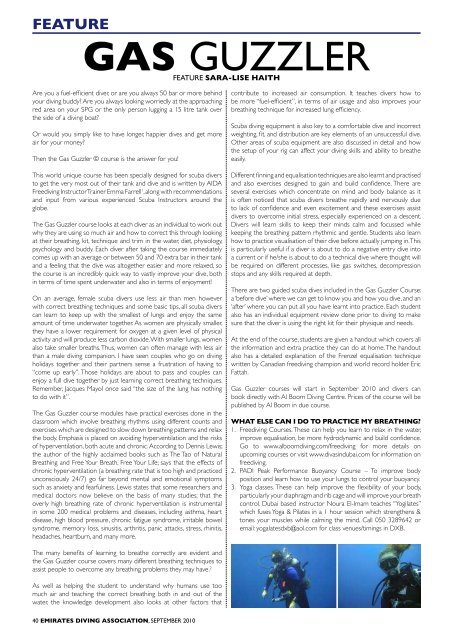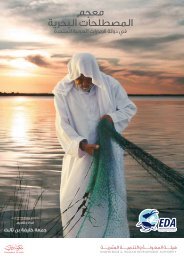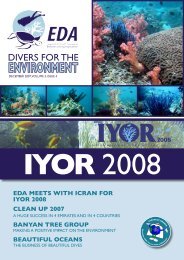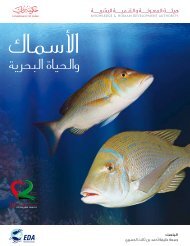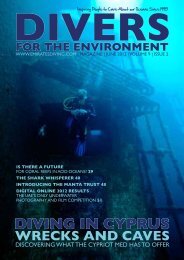NEWS - Emirates Diving Association
NEWS - Emirates Diving Association
NEWS - Emirates Diving Association
Create successful ePaper yourself
Turn your PDF publications into a flip-book with our unique Google optimized e-Paper software.
FEATURE<br />
GAS GUZZLER<br />
FEATURE SARA-LISE HAITH<br />
Are you a fuel-efficient diver, or are you always 50 bar or more behind<br />
your diving buddy? Are you always looking worriedly at the approaching<br />
red area on your SPG or the only person lugging a 15 litre tank over<br />
the side of a diving boat?<br />
Or would you simply like to have longer, happier dives and get more<br />
air for your money?<br />
Then the Gas Guzzler © course is the answer for you!<br />
This world unique course has been specially designed for scuba divers<br />
to get the very most out of their tank and dive and is written by AIDA<br />
Freediving Instructor Trainer Emma Farrell 1 , along with recommendations<br />
and input from various experienced Scuba Instructors around the<br />
globe.<br />
The Gas Guzzler course looks at each diver as an individual to work out<br />
why they are using so much air and how to correct this through looking<br />
at their breathing, kit, technique and trim in the water, diet, physiology,<br />
psychology and buddy. Each diver after taking the course immediately<br />
comes up with an average or between 50 and 70 extra bar in their tank<br />
and a feeling that the dive was altogether easier and more relaxed, so<br />
the course is an incredibly quick way to vastly improve your dive, both<br />
in terms of time spent underwater and also in terms of enjoyment!<br />
On an average, female scuba divers use less air than men however<br />
with correct breathing techniques and some basic tips, all scuba divers<br />
can learn to keep up with the smallest of lungs and enjoy the same<br />
amount of time underwater together. As women are physically smaller,<br />
they have a lower requirement for oxygen at a given level of physical<br />
activity and will produce less carbon dioxide. With smaller lungs, women<br />
also take smaller breaths. Thus, women can often manage with less air<br />
than a male diving companion. I have seen couples who go on diving<br />
holidays together and their partners sense a frustration of having to<br />
“come up early”. Those holidays are about to pass and couples can<br />
enjoy a full dive together by just learning correct breathing techniques.<br />
Remember, Jacques Mayol once said “the size of the lung has nothing<br />
to do with it”.<br />
The Gas Guzzler course modules have practical exercises done in the<br />
classroom which involve breathing rhythms using different counts and<br />
exercises which are designed to slow down breathing patterns and relax<br />
the body. Emphasis is placed on avoiding hyperventilation and the risks<br />
of hyperventilation, both acute and chronic. According to Dennis Lewis;<br />
the author of the highly acclaimed books such as The Tao of Natural<br />
Breathing and Free Your Breath, Free Your Life; says that the effects of<br />
chronic hyperventilation (a breathing rate that is too high and practiced<br />
unconsciously 24/7) go far beyond mental and emotional symptoms<br />
such as anxiety and fearfulness. Lewis states that some researchers and<br />
medical doctors now believe on the basis of many studies; that the<br />
overly high breathing rate of chronic hyperventilation is instrumental<br />
in some 200 medical problems and diseases, including asthma, heart<br />
disease, high blood pressure, chronic fatigue syndrome, irritable bowel<br />
syndrome, memory loss, sinusitis, arthritis, panic attacks, stress, rhinitis,<br />
headaches, heartburn, and many more.<br />
The many benefits of learning to breathe correctly are evident and<br />
the Gas Guzzler course covers many different breathing techniques to<br />
assist people to overcome any breathing problems they may have. 2<br />
As well as helping the student to understand why humans use too<br />
much air and teaching the correct breathing both in and out of the<br />
water, the knowledge development also looks at other factors that<br />
contribute to increased air consumption. It teaches divers how to<br />
be more “fuel-efficient”, in terms of air usage and also improves your<br />
breathing technique for increased lung efficiency.<br />
Scuba diving equipment is also key to a comfortable dive and incorrect<br />
weighting, fit, and distribution are key elements of an unsuccessful dive.<br />
Other areas of scuba equipment are also discussed in detail and how<br />
the setup of your rig can affect your diving skills and ability to breathe<br />
easily.<br />
Different finning and equalisation techniques are also learnt and practised<br />
and also exercises designed to gain and build confidence. There are<br />
several exercises which concentrate on mind and body balance as it<br />
is often noticed that scuba divers breathe rapidly and nervously due<br />
to lack of confidence and even excitement and these exercises assist<br />
divers to overcome initial stress, especially experienced on a descent.<br />
Divers will learn skills to keep their minds calm and focussed while<br />
keeping the breathing pattern rhythmic and gentle. Students also learn<br />
how to practice visualisation of their dive before actually jumping in. This<br />
is particularly useful if a diver is about to do a negative entry dive into<br />
a current or if he/she is about to do a technical dive where thought will<br />
be required on different processes, like gas switches, decompression<br />
stops and any skills required at depth.<br />
There are two guided scuba dives included in the Gas Guzzler Course:<br />
a ‘before dive’ where we can get to know you and how you dive, and an<br />
‘after’ where you can put all you have learnt into practice. Each student<br />
also has an individual equipment review done prior to diving to make<br />
sure that the diver is using the right kit for their physique and needs.<br />
At the end of the course, students are given a handout which covers all<br />
the information and extra practice they can do at home. The handout<br />
also has a detailed explanation of the Frenzel equalisation technique<br />
written by Canadian freediving champion and world record holder Eric<br />
Fattah.<br />
Gas Guzzler courses will start in September 2010 and divers can<br />
book directly with Al Boom <strong>Diving</strong> Centre. Prices of the course will be<br />
published by Al Boom in due course.<br />
What else can I do to practice my breathing?<br />
1. Freediving Courses. These can help you learn to relax in the water,<br />
improve equalisation, be more hydrodynamic and build confidence.<br />
Go to www.alboomdiving.com/freediving for more details on<br />
upcoming courses or visit www.divasindubai.com for information on<br />
freediving.<br />
2. PADI Peak Performance Buoyancy Course – To improve body<br />
position and learn how to use your lungs to control your buoyancy.<br />
3. Yoga classes. These can help improve the flexibility of your body,<br />
particularly your diaphragm and rib cage and will improve your breath<br />
control. Dubai based instructor Noura El-Imam teaches “Yogilates”<br />
which fuses Yoga & Pilates in a 1 hour session which strengthens &<br />
tones your muscles while calming the mind. Call 050 3289642 or<br />
email: yogalatesdxb@aol.com for class venues/timings in DXB.<br />
Further reading and resources:<br />
One Breath: A Reflection on Freediving<br />
Emma Farrell<br />
Pynto Ltd<br />
http://www.pynto.com/onebreath<br />
The Breathing Book: Good health and vitality through essential breath<br />
work<br />
Donna Farhi<br />
Henry Holt and Company<br />
ISBN 0 8050 4297 0<br />
Don’t Hold Your Breath. A Guide to Good Breathing<br />
Jenny Beeken<br />
Polair Publishing<br />
ISBN 0 9545389-9-4<br />
The Yoga of Breath. A Step by Step Guide to Pranayama<br />
Richard Rosen<br />
Shambhala Publications<br />
ISBN 978-1-57062-889-4<br />
Light on Pranayama. The Yogic Art of Breathing<br />
B.K.S Iyengar<br />
Crossroad Publishing Company<br />
ISBN 0 8245 06863 0<br />
YOGA The Path to Holistic Health<br />
B.K.S Iyengar<br />
Dorling Kindersley<br />
ISBN 0 7513 2617 2<br />
The Frenzel Technique, Step-by-Step<br />
by Eric Fattah, Copyright © 2001<br />
efattah@interchange.ubc.ca<br />
REFERENCES:<br />
1<br />
Emma Farrell is a founding member of the AIDA International Education<br />
Commission, setting course guidelines and standards for Instructors<br />
worldwide, and has written the unique ‘Gas Guzzler’ course designed<br />
to help scuba divers with their breathing underwater. Al Boom Dive<br />
is the first dive centre ever to be given the opportunity to offer this<br />
course and it will be taught exclusively by IDC Staff Instructor and AIDA<br />
Freediving Instructor Sara-Lise Haith. Emma is a trained Sivananda Yoga<br />
teacher and a practicising Reflexologist and she has used her in-depth<br />
knowledge of physiology and years of teaching divers and athletes how<br />
to breathe to develop the content of this course.<br />
2<br />
Note: The Gas Guzzler course is not designed to guarantee a solution<br />
to severe respiratory problems and students should always seek<br />
professional medical advice.<br />
FEATURE<br />
UPDATE: THE<br />
SHARKWATCH<br />
ARABIA<br />
INITIATIVE<br />
Feature DAVID ROBINSON<br />
Since its launch in June of this year, the response to Sharkwatch Arabia<br />
for whale shark sightings has been a largely encouraging one. Despite<br />
being in its early stages as a dedicated whale shark research project,<br />
the diving communities in this region obviously do care considerably<br />
about these large and majestic creatures as is shown by the amount<br />
of support we have received so far. I am happy to say that we have<br />
already received many images of whale sharks from around the region<br />
suggesting that there may be a significantly larger number of animals<br />
visiting our waters than previously thought. Many divers have started<br />
to support the cause by sending in images that they have taken whilst<br />
diving and slowly but surely dive centers are also offering help with data<br />
collection.<br />
We still have a long way to go in order to get everybody onboard and<br />
helping. We are now calling on all dive centers and dive professionals to<br />
contact us to help out with data collection. Over the next few months<br />
we will be putting data collection and research protocols in place to<br />
help with data collection; and we need help and support from the<br />
diving community to be able to do this. If you are willing to help then<br />
please get in touch, there is no cost involved, the techniques utilized are<br />
quick and simple, all equipment will be provided and it will not interfere<br />
with your everyday work.<br />
So far we have had images sent in from as far away as Pakistan,<br />
Baluchistan and more closely from the UAE East Coast, Abu Dhabi,<br />
Musandam, Qatar and Bahrain, (from where there was an important<br />
recent sighting of a possibly pregnant female).<br />
We have also recorded the first whale shark of the season from the<br />
Daymaniyats Islands, Oman, which was spotted and photographed by<br />
the dive masters at Extra Divers Al Suwadi. The dive masters managed<br />
to get a left and right side profile as well as a ventral shot allowing<br />
us to get a full ID of the animal and to determine that the shark was<br />
indeed a juvenile female. The dive center named her ‘Ali-son’ after<br />
the dive master who spotted the shark and we provided them with<br />
information about how to recognise her again so that their customers<br />
could compare any further sightings. As part of the Sharkwatch Arabia<br />
feedback to contributors, we are happy to do this for any dive center<br />
that is interested so that they can recognise the sharks that they are<br />
seeing and pass this on to their customers.<br />
If you are a dive center or dive professional in the region and would<br />
like to get involved with Sharkwatch Arabia then please register online<br />
at www.sharkwatcharabia.com. A set of 3 fantastic posters featuring<br />
pictures by Warren Baverstock that form part of our “Spot the<br />
Difference” campaign, (shown in this issue of the EDA magazine), have<br />
been produced with the kind support of EDA and The Sharkquest<br />
Arabia Initiative and are now available to be distributed FOC to dive<br />
centers in the region. If you would like to be sent the posters for display<br />
in your dive center or dive shop please contact us at sharkwatcharabia@<br />
gmail.com or approach EDA directly.<br />
Keep up the good work and thanks for all the support.<br />
40 EMIRATES DIVING ASSOCIATION, SEPTEMBER 2010 SEPTEMBER 2010, EMIRATES DIVING ASSOCIATION 41


